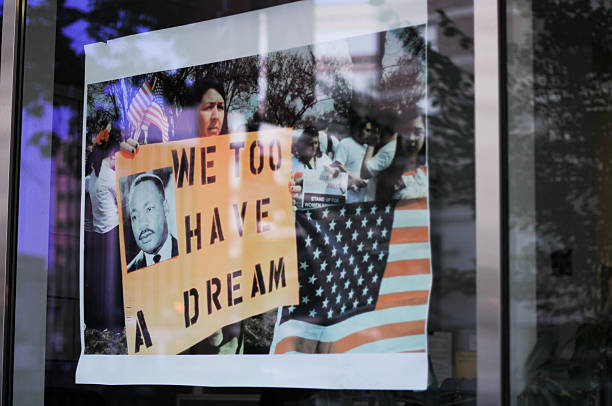Martin Luther King Jr. has always been a beacon of leadership in the civil rights department, even after his death.
Many times, the man has proven to be resourceful, hopeful, and astonishing.
One of the many examples lies in the year 1960 – when he fiercely fought for human rights and equality for not just African Americans but for all the sufferers of oppression through nonviolent and notable marches.
- 100% secure
- 100% secure
- 100% secure
His incredible stances, movements, and actions were the driving force behind countless historic events, number one and two being the Montgomery Bus Boycott and the 1963 March on Washington. These marches helped to achieve landmark legislation like the Voting Rights Act and the Civil Rights Act.
What a man!
Sometime before his death, King was arrested in 1967 and sent to Birmingham jail for protesting against the ban on racial mixing.
In confinement, King penned his infamous “Letter from Birmingham.” To this day, that letter holds significant value, and not just from a historical point of view, but for his grammatical strategies.
King used three powerful rhetorical strategies—pathos, ethos, and logos—were used in the letter to appeal to the target audience effectively. Through this letter, King addresses the concerns of white religious clergy members.
He explains why he is in Alabama. His reasons for breaking the law. His disappointment in the church. He hopes to end racial prejudice and reach a mutual understanding between the two communities.
Download the Letter from Birmingham Jail annotated PDF for more insights.
As you read the letter, you will see that its audience is not just clergypersons but also a broad range of people in American society. King appeals for unity against racism and advocates for human rights by using ethos to establish his credibility.
He also uses pathos to evoke emotional responses from readers and encourage them to take action. He does not present logical arguments to prove his stance and justify the fight against white supremacy.
The letter's reflective tone reaches out to the oppressed and their oppressors. He uses kairos and allusions, which place him in the historical context of his era and the past. Through this essay, he expresses his passion for equality and his literary skills.
Part 1. Rhetorical Appeals

Martin Luther King Jr. uses rhetorical appeals to persuade his readers through his letters' text. He presents moral, logical, emotional, valid, and creditable reasons to justify his actions.
The beauty of his argument is that he does not mention the clergy members in his letter as wrong.
However, he expresses his opinion that the government should actively create favorable conditions for people regardless of race. He concludes the letter with a note that he is only human and desires to build a better society for everyone.
Note: Search for "letter from birmingham jail annotated pdf". This will lead you to resources where the letter is accompanied by annotations explaining the rhetorical devices King employs.
Read on as this part of the blog sheds light on all the rhetorical appeals used in the letter.
Ethos (Establishing Credibility)
The use of ethos in King's letter is highly influential for all readers, beginning with the introduction paragraph. King (1963) states that he earned the title of President of the Southern Christian Leadership Conference and could operate in every Southern state.
By doing so, King creates a moral connection with readers and establishes himself as a figure of authority. Using words like 'president' and 'every' enhances the organization's status as trustworthy and credible, strengthening his ethos appeal.
King was a remarkable speaker of his time, adept at using various rhetorical devices to persuade his audience. In his letter, he references many notable historical figures to support the aim of his writing.
For instance, King (1963) compares himself to the Apostle Paul, who traveled to spread Christianity across Greece and Rome. Beyond Paul, King (1963) mentions prominent personalities like St. Thomas Aquinas, St. Augustine, John Bunyan, Martin Luther, and even Jesus Christ.
By invoking these figures, King persuades his audience that he seeks revolutionary change significant enough to be recorded in history.
References to widely recognized and respected figures are excellent examples of ethos in King's work. He understands that his argument and appeal might be more robust by providing a substantial basis for the revolution he advocates.
Therefore, he uses historical elements to establish his credibility, drawing analogies that others can analyze to understand the effectiveness of his rhetorical strategies.
Pathos (Emotional Appeals)
King makes the situation of human rights clear in his letter. He was jailed for ‘violation of court injunction’ during his 1963 protest against racism in Birmingham.
He was placed in solitary confinement and even denied his right to a phone call (Snyder, 2013). King uses pathos to provoke profound emotions in readers, highlighting the manipulative issues with law enforcement by the clergy members in Birmingham. He acknowledges that the permit requirement was not the real issue but expected intervention from authorities who knew the law.
King argues that the detention of protest members and their treatment by the police and government violated fundamental human rights. His statement is justifiable as the protest was nonviolent, and the police’s actions were a clear violation of his rights (Snyder, 2013).
This message is significant for the audience, showing that anyone could be in his position. King (1963) emphasizes that African Americans have waited too long to gain their human rights, and the actions of the authorities were a direct violation of both national and divine law.
He clarifies that the lack of rights contradicts democracy and the US Constitution, asserting that Blacks deserve their ‘God-given’ rights. In every democratic country, citizens are given freedom of speech if their actions do not violate legal limits.
However, King argues that the human rights situation in Birmingham contradicted the US Constitution’s definition.
King tries to persuade readers about the severity of the human rights situation. According to King (1963), his presence in Birmingham highlighted the miserable human rights conditions, and his arrest by local authorities proved his point. He extensively uses pathos to oppose white supremacy, writing about the poverty and mistreatment of African Americans.
By highlighting the lack of privileges and the resulting backwardness of Blacks, King’s statement emotionally appeals to African Americans, urging them to fight against racism. Using pathos in this rhetorical analysis example helps you understand the concept of emotional appeals and how to use them effectively in your essays.
Logos (Logical Arguments)
The letter includes various logical explanations. As an influential speaker, King adds numerous rational appeals to his work.
One significant logical aspect is his argument on the definition of ‘unjust’ laws. King (1963) defines such laws and provides examples of their enforcement, using standard logic to illustrate how discrimination persists in society without logical fallacies.
He distinguishes between just and unjust laws, arguing that the law used to arrest him exemplifies an ‘unjust law.’
King points out that white supremacists often define laws to their advantage, leaving African Americans with no choice but to resist.
He explains that the white majority discriminates against African Americans, treating them as a minority and denying them fundamental rights granted by the US Constitution and God. King (1963) satirically justifies his presence in Birmingham by stating that he and his friends were “invited” to prison, highlighting the concept of injustice.
He is also reflective in his letter, blending emotional appeals with logical ones to convey his messages effectively. From the perspective of the oppressed, there was no other way to address the problem.
Part 2. Rhetorical Devices

Martin Luther King Jr. was an astonishing man. In his letter, he used a couple of rhetorical appeals to shed light on racial equality.
He used analogies to explain complex matters in a more relatable and understandable way. He also used metaphors to create vivid imagery and accentuate a few critical and forgotten points.
Besides these, here are some key examples of rhetorical devices used in the letter to sway the audience:
Repetition
Martin Luther King Jr. uses repetition to emphasize key points and reinforce his arguments. In the letter, you will find many repeated structures and sentences that create a rhythmic impact.
Each of these repeated structures and messages conveys something beyond the ordinary.
For example, the repetition of the phrase "injustice anywhere is a threat to justice everywhere" is a touching reminder of the status of equality within communities and the universal significance of justice.
This technique highlights the perseverance in addressing injustice. At the same time, it unites his audience around a shared principle. This approach, as a result, makes the message more impactful.
Metaphor and Analogy
The usage of metaphors and analogies further strengthens the message. The way he draws robust comparisons that shed light on the plight of African Americans and the broader civil rights movement is impeccable.
By comparing segregation to a "lonely island of poverty in the vast ocean of material prosperity," King illustrates the stark disparity between the conditions of African Americans and the wealth and opportunities available to others in America. This metaphor captures the discrimination experienced by the Africans.
Furthermore, King draws powerful connections between the civil rights movement and earlier historical movements for justice and freedom.
He increased the validity and intensity of the cause by drawing parallels between the struggle for civil rights and well-known historical occurrences.
These comparisons contextualize the civil rights movement within a broader narrative of human rights struggles and appeal to his readers' shared values and moral principles.
Allusion
The use of allusion in "Letter from Birmingham Jail" is also worth mentioning. They add weight and significance to his arguments by referencing historical figures, religious texts, and philosophical ideas.
Allusions to historical events allow him to place his arguments within a broader context. King mentions that early Christians were willing to face hungry lions and resist the unjust laws of the Roman Empire and that even Socrates advocated for just civil disobedience.
He does not suggest that Black people should become extremists in their actions; rather, these allusions uplift the discussion from the specific events in Birmingham to larger historical and philosophical contexts.
While the clergypersons position themselves within the Birmingham community, King's allusions establish him as a member of human civilization throughout history.
He also emphasizes the need for justice on a national scale, valuing justice and peace as the cornerstones of a civil and democratic society. He uses allusions to underline that justice and peace are paramount for any civil and democratic society.
Rhetorical Questions
Dr. King strategically uses rhetorical questions throughout the letter. These questions serve multiple purposes:
- Challenging Assumptions: King uses questions to disrupt the reader's comfortable assumptions about race and justice. For example, he asks, "Isn't this like condemning a robbed man...?" This forces the reader to confront the illogicality of blaming victims for their plight.
- Promoting Engagement: Questions spark active engagement with the text. King encourages readers to evaluate their beliefs about the Civil Rights Movement and broader equality issues by asking questions that do notdemand answers but rather reflection.
- Self-Reflection: Questions like "Will we be extremists for hate or love?" prompt the readers to self-reflect and evaluate their actions and motivations. This introspection challenges complacency and indifference towards social justice.
King challenges his audience to think about their views on race critically and encourages them to choose justice and love over hatred and apathy.
Part 3. The Neverending Power of Rhetoric

The brilliance of Martin Luther King Jr.'s speech in "Letter from Birmingham Jail" caused a revolution in the civil rights movement. King's use of language creates a convincing case that transformed the Civil Rights Movement beyond merely promoting justice and equality.
In addition to persuading, his use of rhetorical devices like metaphors, analogies, and repetition captivates, provokes, and uplifts his audience. Rhetorical questions can strategically provoke readers' assumptions and encourage self-reflection. In fact, it challenges people to face their prejudices.
The influence of the letter is evident – decades later, its message continues to be mentioned in discussions of social justice and effective communication.
This relevance, combined with King's eloquent use of language, makes "Letter from Birmingham Jail" a cornerstone of rhetorical analysis and a powerful tool for advocating for civil rights.
So, what are you waiting for? Download Letter from Birmingham Jail Annotated for Rhetorical Devices PDF now!
Also, if the document requires any more notable highlights and notes – or even just your thoughts about the speech – install the AfirstsoftPDF and add all the extra annotations you think seem valid.
- 100% secure
- 100% secure
- 100% secure




